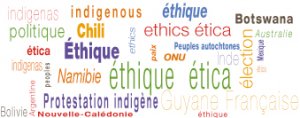

Concept-clés | Ethics
Ethics | - 26 mai 2011

Ethical interrogations have long been part of academic research although they have long been limited to the domains of philosophy and medicine. Today however, ethical issues are transversal to the whole sciences and human activities. They are formalized as guidelines and protocols or are enshrined in law. With the development of the Human Rights regime and institutions, every discipline and domain of activity is confronted to the question of how to act in the best possible way.
Ethics in Anthropology
An ethical concern with social progress has been central to the development of the anthropological discipline. However it is the pragmatic dimension of fieldwork and human encounter that has been the most important source for the formalization of ethical interrogations and recommendations by academic institutions.
The 1967 “Statement on Problems of Anthropological Research and Ethics” by the Executive Council of the American Anthropological Association is certainly one of the very first documents establishing ethical principles for anthropological research. In the midst of the Viet Nam war, and in the larger frame of the Cold War, anthropologists were wary of the possible use of their work by the American army and government. Since then, the AAA has regularly published and updated its Code for Ethics in Anthropology.
Ethics in Indigenous Research
The development of ethical standards for research in indigenous contexts, with indigenous people, has followed a different trajectory. It is not so much the result of a reflexive turn by professionals confronted to dilemmas as the result of a mobilization by indigenous peoples in order to be recognized as full human subjects rather than passive objects of research. The political demand for partnership expressed in the UNDRIP is mirrored in the ethical demand for collaborative research.
In the United States, Lakota author Vine Deloria Jr’s critique of anthropology signals the shift towards such a demand. Linda Tuhiwai Smith’s Decolonizing Methodologies (1999) develops a radical critique of anthropological research as participating in the subjugation of indigenous peoples and their systems of knowledge. It argues for a research methodology based on indigenous social organization and protocols.
The recognition of indigenous systems of knowledge, the protection and valorization of their intellectual and cultural property, the respect of indigenous rights and their effective participation at every step of the research process remain significant challenges.
In Canada and Australia, First Nations, Inuit and Métis, Aboriginal and Torres Strait Islanders people have been developing in collaboration with research institutions since the 1980s guidelines and protocols for anthropological research which formally elaborate on the ethical principles of collaboration and mutual respect.
The Australian Institute of Aboriginal and Torres Strait Islander Studies Guidelines for Ethical Research in Indigenous Studies (currently under review) and the First Nations of Quebec and Labrador Research protocol are two of the most developed and referenced tools for the development of ethical research with indigenous groups.
Guiding principles
Within SOGIP, researchers develop their research project according to the specific contexts in which they work. Doing so, they pursuie ethical objectives according to the following principles :
- FPIC – Free, Prior and Informed Consent. Enshrined in the UNDRIP as a fundamentl principle of engagement with and by indigenous peoples, it is applicable to all domains of research. In practice, it means that the objects, methods and results of research have to be negotiated for the whole duration of a research prject. It also implies that the sharing of risks and benefits be integrated to the research poroject and negotiated by all stakeholders. Consent forms may or must be used, according to national contexts, in order to demonstrate or reinforce the principle of FPIC.
- OCAP (Canada) : Ownership, Control, Access, Possession. These criteria were developed by First Nations peoples of Canda : collective ownership of information ; control of research and information by First Nations ; Access to data and its management ; physical possession of data.
- ICIP : Indigenous Cultural and Intellectual Property. Particularly salient with regard to traditional ecological knowledge and indigenous systems of knowledge and their diverse manifestations. The ICIP does not exactly fit into intellectual property protection regimes, both at the national and international levels. The WIPO is working towards such an instrument through its different working groups. Some international conventions, such as UNESCO’s Convention on Biological Diversity or the Convention for the Protection of Immaterial Heritage, integrate provisions to protect indigenous knowledge. The Nagoya Protocol open for signature in 2011 aims to guarantee the fair and equitable sharing of benefits arising from the utilization of genetic resources. Any research developed with indigenous peoples imply recognition of indigenous intellectual and conceptual import, as well as specific representations which should be paid for and valorized.
 Version imprimable
Version imprimableTerri Janke’s reports on Indigenous intellectual and cultural property -* first report and -* second report





